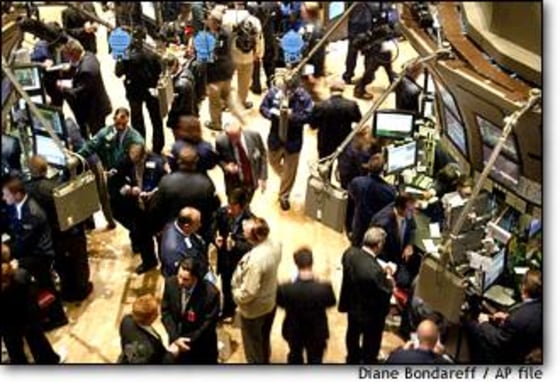With the New York Stock Exchange in turmoil after a pay scandal forced the resignation of Chairman Richard Grasso last week, rival, electronic trading platforms are looking to lure business away from the 211-year-old institution. But experts say such a move might not be in the best interests of investors.
The Grasso pay scandal isn’t the first crisis to hit the exchange in recent months. An investigation into “specialists,” who act as middlemen between buyers and sellers and trade stocks on the floor of the exchange, examined whether they violated NYSE rules by trading stock for their own accounts ahead of their customers.
Rival marketplaces, such as ECNs — electronic communication networks that link up traders and eliminate middlemen — are hoping to profit from the Big Board’s recent troubles.
Instinet Group, for example, has launched a new advertising campaign that appears to take aim at the NYSE’s recent regulatory woes. And a similar marketing campaign from the Archipelago Exchange, or ArcaEx — a Chicago electronic-trading site which recently won the right to become a fully-fledged stock exchange — seems intent on capitalizing on investor uncertainty about the Big Board’s trading practices.
“We are aggressively advertising and marketing ourselves,” said Andrew Goldman, executive vice president of marketing and communications at Instinet. Goldman said many electronic networks have felt frustrated by what they see as excessive regulation governing trading stocks listed on the NYSE.
“We want to knock down barriers blocking competition and deliver greater benefits to the investors,” added Goldman. “We know that there is a great deal of frustration over how customers’ orders are handled and it’s an issue that should be decided by allowing both markets to compete side by side.”
ECNs like Instinet handle only a tiny share of the stocks listed on the Big Board. Instinet’s share, for example, is some 4 percent. But if regulatory reforms that are unfriendly to the Big Board are pushed through at the NYSE, electronic markets may stand to gain a greater share of the market according to Michael Goldstein, an associate professor of finance at Babson College in Massachusetts who has served a one-year term as visiting economist at the New York Stock Exchange.
The Big Board is one of the few world markets to use human beings — floor traders known as specialists — to match buyers and sellers in a trading system known as “open outcry.” Electronic markets, by contrast, connect traders through a vast network of computers.
If regulators chose to take steps to harmonize the disparate trading standards it could create more opportunities for electronic markets, said Goldstein, particularly if they are more automated. “But I don’t think it will necessarily be good for the marketplace or for [small investors],” he added.
Goldstein equates electronic trading to Internet dating.
“Sometimes it works really well and at other times it works out terribly. But the human interaction in the specialist system can link up buyers and sellers who didn’t even know they wanted to do a trade, so you tend to get better hookups,” Goldstein added.
With this in mind, “regulators should tread very carefully when it comes to dealing with changes in the world’s most liquid and largest market for stocks,” he added. “ECNs are constantly trying to get humans out of the treading system, but it’s working pretty darn well.”
Steve Thel, a securities law professor at Fordham University in New York, also thinks the specialist structure at the Big Board is an efficient trading system. A bigger issue for the exchange is the issue of its tarnished reputation, he added.
“You get the sense that people at the exchange are worried about ECNs,” Thel said, adding that the NYSE has lost a lot less business to ECNs than the Nasdaq market.
For the NYSE to remain competitive against ECNs, Thel added, it must deal with a perception that its trading system is corrupt. “The issue now is whether the NYSE can crack down on the regulatory front and make sure they are operating and providing an efficient and effective market,” he said.
Handling some 80 percent of the trading volume in its own listed stocks, the New York Stock Exchange is the nation’s largest marketplace for stocks.
But news of Richard Grasso’s $187.5 million retirement package, approved by a board of directors he largely selected, has tarnished the institution’s reputation.
The scandal provoked a chorus of disapproval from institutional investors and exchange members, some of whom say it is now time to rethink the exchange’s role as both a marketplace and regulator.
On Wednesday, officials from seven U.S. states, who collectively oversee more than $586 billion in public pension funds, called on the Big Board to implement sweeping corporate governance reforms, including the restructuring of its board of directors, which is heavily populated with financial services executives.
The exchange moved swiftly to defuse the situation last weekend, naming John Reed, a respected former chairman of CitiGroup, as an interim replacement for Grasso. And late Thursday, H. Carl McCall, board member and head the NYSE’s compensation committee that approved Grasso’s pay package, announced his resignation.
